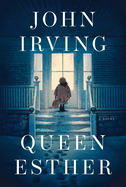
For anyone who's followed John Irving's nearly six-decades-long literary career, settling into another of his novels feels like stepping into a beloved pair of slippers. But, as he demonstrates in Queen Esther, that sense of homecoming shouldn't distract readers from the insight and empathy that have consistently characterized his work, including this tenderhearted bildungsroman about a writer whose life, not surprisingly, bears some similarity to Irving's own.
Queen Esther tells the story of Jimmy Winslow, whose story is intertwined with that of Esther Nacht, who is Jewish and was born in Vienna in 1905. She emigrates with her parents at age three, and as a teenager, Esther is brought into Jimmy's grandparent's household to serve as an au pair. Irving (Avenue of Mysteries), who has tackled the issue of bigotry against sexual minorities in previous novels, subtly but persistently raises awareness here about the pervasiveness of antisemitism. It manifests in the townspeople's genteel-seeming bigotry, and surfaces in Esther's native Austria, where Jimmy spends his junior year of college, feeling the first stirrings of his dream to become a writer.
With its New England and Vienna settings, presence of a handful of wrestlers, prominent role of an animal, and lots of talk about sexual subjects, many of Irving's familiar tropes are here to delight his longtime readers. At its heart, Queen Esther is a gentle story about identity and family, the one we're born into and the one that, if we're fortunate, grows organically out a lifetime of loving relationships. It clearly reflects John Irving's compassion and generosity of spirit, recognizing our flaws while still focusing on what's best in us. --Harvey Freedenberg, freelance reviewer

